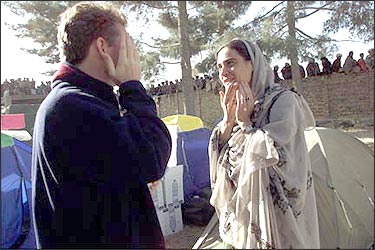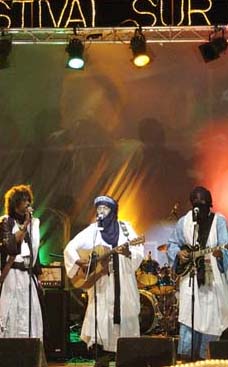
From her experience in the Peace Corps, she'd learned to integrate with the locals, so when she ended up in Kandahar, she went to live with an Afghan family. "There were 22 of us in there, counting a dozen kids, not counting the cow and her calf and two oversized brown Turkish sheep," she writes. "We had no running water, but we did have our own well and reliable electricity. I spent the nights with my driver and my youngest host-brother, in the public part of the compound." The big advantage of her strategy was that she soon became accepted, enjoying privileges denied to other foreigners. She learned the Afghans' way of life - their tribal laws and their mendacity - and watched with growing disbelief as the invasion was mishandled. "Basically, I took what our governments said on face value," says Sarah. "There were two stated agendas. The first was the democracy, the nation-building thing, that we're going to help Afghan institutions into a healthy democracy. The other one was that we were going to hunt down al Qaida, but that was in contradiction with the first agenda because the way we did it was like cowboys." Morocco RPCV Sarah Chayes has made a home in Kandahar, Afghanistan, became fluent in Pashto, one of the main Afghan languages, and devoted her energies to rebuilding a country gutted by two decades of war
As a female journalist in Afghanistan, Sarah Chayes embraced the culture - including dressing as an Afghan man - to win a host of powerful friends
Into the soul of Afghanistan
As a female journalist in Afghanistan, Sarah Chayes embraced the culture - including dressing as an Afghan man - to win a host of powerful friends.
She talks to Women's Editor Sarah Foster about her life changing experience and shares her thoughts on the war on terror and its aftermath.
THE blood-soaked body of her friend lay stiff and lifeless in the van and Sarah Chayes, his sole companion on the lonely road to Khakrez, was understandably bereft. "I sat in the van, keeping him company for a little while. Afghans don't do that. They don't sit with the bodies of their dead. But I couldn't keep myself away," she writes in her book, The Punishment of Virtue. "'There he is, your friend!' his brother cried as he pulled back the blanket to show me his face. It was perfect, come to rest in that stern, almost brooding expression of his. Only a nick, a bit of a bruise, and a scrape above the right eye marred his features. Then what killed him?"
advertisement
The crucial question was one that Sarah couldn't escape. By now she knew Afghanistan well, its many quirks and strange anomalies, and she'd begun to trust her instincts. The problem was, what she'd been told by the authorities - that Muhammad Akrem Khakrezwal, the erstwhile Kandahar police chief, had met his end by suicide bombing - just didn't wash. She did what any true friend would and started asking awkward questions, and the result sounds more like fiction than the truth.
'What's interesting is that nobody did that interviewing except me - I'm the only one who actually made the effort," says 45-year-old Sarah. "I know what happened - I don't know precisely who did it but I know it was a remote controlled mine placed under the rug at the mosque. What I was able to prove is that there was no suicide bomber. What that means is that it was premeditated, and logically, that it was the ISI (Pakistan's spy agency the Inter-Services Intelligence) and that somebody who was in charge of the Kandahar police and also somebody who was in charge of the mosque allowed somebody in that night.
"The Afghan government tried to make out that it was not targeted at him and if you buy that story, the political solution is more of the same. If you buy my version, the Afghan government has got to get Pakistan out of its administration and the American government has to get tough with Pakistan."
How things develop in Afghanistan will be of great concern to Sarah. Now mostly living in the country, she feels it truly is her home. It all began with 9/11, when as a radio reporter, she sensed the world had changed its course.
"There was a lot of heavy duty stuff going on in the world and there I was, reporting on food in Paris," says the native American. "Then we all got our lights blown out by 9/11. When that happened, I don't think there was much doubt in anyone's mind that this was going to have a major impact on how the 21st Century was going to unfold."
When fighting started in Afghanistan, she told her editor at NPR, the US National Public Radio: "If you need me, I'm yours" - and was dispatched to work in Quetta, in Pakistan, from where the Taliban had come. It was a rarefied existence, with journalists keeping to themselves, but Sarah chose to break the mould. Instead of wearing Western clothes and camping out at an hotel, she tried to understand the culture by getting underneath its skin. "I went with Afghan men's clothing and eventually, by summer 2002, I started tying a turban instead of wearing a shawl," she says. "It was the principle of optics - our eyes don't actually see everything that our brain registers. If I could look mostly like what people expected to see (an Afghan man), people's brains would connect the dots."
From her experience in the Peace Corps, she'd learned to integrate with the locals, so when she ended up in Kandahar, she went to live with an Afghan family. "There were 22 of us in there, counting a dozen kids, not counting the cow and her calf and two oversized brown Turkish sheep," she writes. "We had no running water, but we did have our own well and reliable electricity. I spent the nights with my driver and my youngest host-brother, in the public part of the compound. "
The big advantage of her strategy was that she soon became accepted, enjoying privileges denied to other foreigners. She learned the Afghans' way of life - their tribal laws and their mendacity - and watched with growing disbelief as the invasion was mishandled. "Basically, I took what our governments said on face value," says Sarah. "There were two stated agendas. The first was the democracy, the nation-building thing, that we're going to help Afghan institutions into a healthy democracy. The other one was that we were going to hunt down al Qaida, but that was in contradiction with the first agenda because the way we did it was like cowboys."
A key example Sarah cites is when the Americans, confused by tribal affiliations, supported two competing factions in the battle for Kandahar. She says the warlord, Gul Agha Shirzai, was given patronage while honorable Akrem, the chief of police, was deemed a worthless sacrifice.
As Sarah's posting in Afghanistan drew to its end, she knew she didn't want to leave. She was invited for a meal by Aziz Khan Karzai, whose nephew Hamid is the President, and he made an offer that she jumped at. "I turned in the doorway to thank Aziz and abruptly he asked me: 'Wouldn't you come back to help us?'," she writes.
She returned to the US to raise some money, with the intention that she'd operate a charity. When this proved difficult she launched a company instead. Now she's involved in running Arghand, which makes a range of luxury soaps, and says she hopes it might help bolster the economy.
Life may be far from being easy - the streets of Kandahar are still a dangerous place - but she's prepared to stick it out. She gets frustrated now and then, but feels fulfilled by what she does. "It's kind of hard to imagine anything more interesting that one could have done, so I'm grateful for that, as difficult as it is sometimes," says Sarah.
The Punishment of Virtue by Sarah Chayes (Portobello Books, £20).
















